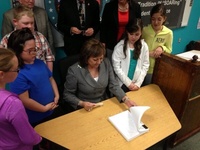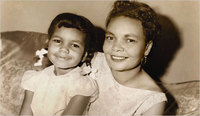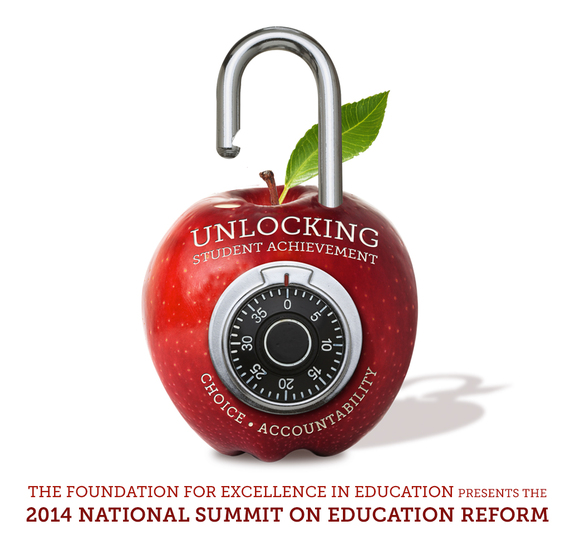 "When we set high standards for our students and teachers," says New Mexico governor Susana Martinez, "they always rise to the occasion." It's true, of course: The more we ask of children, the more they can do; the higher the standards we set for those who teach children, the farther they will reach. That is why it is gratifying that Governor Martinez will share the stage with another high-achieving, high-standards individual, former Secretary of State Condoleezza Rice, at the National Summit on Education Reform this month in Washington DC.
"When we set high standards for our students and teachers," says New Mexico governor Susana Martinez, "they always rise to the occasion." It's true, of course: The more we ask of children, the more they can do; the higher the standards we set for those who teach children, the farther they will reach. That is why it is gratifying that Governor Martinez will share the stage with another high-achieving, high-standards individual, former Secretary of State Condoleezza Rice, at the National Summit on Education Reform this month in Washington DC.
 Both women have firsthand knowledge of the ongoing fight to ensure quality education for all our kids, whatever their background. Dr. Rice was born into the segregated South; Governor Martinez is the granddaughter of Mexican immigrants. Both are powerful models of what can happen when individuals are challenged to reach their full potential.
Both women have firsthand knowledge of the ongoing fight to ensure quality education for all our kids, whatever their background. Dr. Rice was born into the segregated South; Governor Martinez is the granddaughter of Mexican immigrants. Both are powerful models of what can happen when individuals are challenged to reach their full potential.
So it is fitting that these two should headline a conference on education reform, and it is equally fitting that the conference should coincide with National Education Week, when America's most influential education leaders, hosted by former Governor Jeb Bush will gather at his Foundation for Excellence in Education's annual meeting to review national education policy, report on trends, recent policy implementations, and educational innovation to serve students from early childhood and K-12 through higher education and lifelong learning.
 The conversation that week should be so fruitful and fulfilling that it will either amp up our appetites for Thanksgiving dinner, or render the meal superfluous! Whichever outcome it produces, I personally hope the policy conversation will focus on providing STEM and computing education for all the nation's kids, for I believe that the central challenge of our educational system today is to ensure that all 55 million children in K-12 are fluent in the 'New Literacy'--the computing innovation and coding skills which are the core skills of this century, as essential to economic success, citizenship, innovation, and individual fulfillment as reading and writing were to the last century.
The conversation that week should be so fruitful and fulfilling that it will either amp up our appetites for Thanksgiving dinner, or render the meal superfluous! Whichever outcome it produces, I personally hope the policy conversation will focus on providing STEM and computing education for all the nation's kids, for I believe that the central challenge of our educational system today is to ensure that all 55 million children in K-12 are fluent in the 'New Literacy'--the computing innovation and coding skills which are the core skills of this century, as essential to economic success, citizenship, innovation, and individual fulfillment as reading and writing were to the last century.
The 20th century made "universal literacy" a central goal. The aim was to extend the skills of reading and writing, once confined to a small group of professionals and wealthy individuals, to the mass of the population. As reading and writing literacy expanded, so did lives, so did access to knowledge, so did creativity and innovation, and so did the possibilities for individual growth, fulfillment, and leadership.
The children of the 21st century are on the threshold of a similar explosion of possibilities, and we need to ensure that the explosion gets to kids in zipcodes that may be technologically-underserved and shorter on educational funding than they ought to be.
How do we do that? We can begin by challenging all kids to start innovating from a young age--introducing them to a computational problem space as a piece of new learning, and letting them run with it, figure it out, follow it through for hours and days. Along the way, they'll be delving into different subjects and topics, guided by teachers we train, but with resources available online. The technology of today can deliver it (we call it blended learning). The kids can do it (my organization and others have been doing it for over a decade). Today's students can work through more complex processes than the ones currently taught in their schools. If supported properly, we have seen them succeed. The result is the kind of deep learning that is possible with education technology, especially when children are challenged to invent, research, build, question, collaborate, imagine. Today's generation must learn to think critically, to problem-solve, to work with others, to have confidence in themselves as learners. These are the skills they'll need for success in a world that will operate through interactive digital communication in all spheres of life--economically, commercially, in science, entertainment, even human connections.
I'm pretty sure Condoleezza Rice and Susana Martinez both know that it will take something different to prepare today's kids (especially underrepresented minorities and girls) for the jobs of the future from what it took in their generation. In fact, right now, three million STEM jobs remain unfilled because the talent simply isn't there. Certainly both women know that what is even more important than preparing all kids for the jobs we think we can foresee, is to empower them, from a young age, to expand their own lives every which way, any way they like, down any path they choose, for both their lives and achievements embody that kind of self-empowerment.
This is true for all the nation's kids, boys and girls alike. As the discussion goes forward over the next weeks about education reform that reaches into every gender, ethnicity, and neighborhood of the nation, and addresses what Dr. Rice calls the "crisis of opportunity," I hope our education leaders and policy makers will rise to the challenge this November, and make the New Literacy, the literacy of coding that can stimulate innovation and empower self-fulfillment, the new universal goal of education today.
Watch the author, Dr. Idit Harel, who recently spoke at The Atlantic Live in Washington DC about using technologies to improve the education system and why coding is the new literacy.